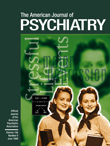Testosterone-Patch-Induced Psychotic Mania
To the Editor: With the introduction of new antiviral agents, longevity has increased for many AIDS patients, along with the potential for AIDS wasting syndrome. Suggested remedies for this syndrome have included growth hormone, marijuana, appetite stimulants, ketotifen, exercise, anabolic steroids, and most recently, the testosterone patch. The effects of anabolic steroids on behavior have long been recognized and include mood lability, irritability, euphoria, insomnia, aggression, and sometimes delusions or hallucinations. Reports of behavioral effects of exogenous testosterone are limited and inconsistent (1). One study of intramuscular testosterone for male sexual dysfunction found irritability and uncharacteristic assertiveness in some patients (2), but there are no documented behavioral side effects of the testosterone patch. We report the first case of psychotic mania associated with testosterone patch administration.
Mr. A, a 28-year-old Caucasian man with AIDS, came to the emergency department after 2 weeks of worsening mania with an elevated mood, increased energy, decreased sleep, increased activity, racing thoughts, grandiose delusions, and auditory hallucinations. Approximately 1 month earlier, he was prescribed the testosterone patch for a 20-lb weight loss occurring over the previous 2 years. Mr. A had a history of bipolar II disorder (DSM-IV) but had never previously become psychotic or required hospitalization. A medical workup excluded infection or other AIDS-related processes as the cause of his psychosis. He was started on a regimen of divalproex, 500 mg/b.i.d., and his usual anti-AIDS regimen was continued, except for the testosterone patch. By day three, his sleep and energy had improved, but his psychosis and racing thoughts persisted. A regimen of risperidone, 4 mg at bedtime, was added with good results. Because he had a history of idiopathic thrombocytopenic purpura, his dose of divalproex was discontinued on the fourth day when his platelet count dropped from 100,000 to 65,000. Although Mr. A refused to take another mood stabilizer, he remained much improved and was discharged on a regimen of risperidone monotherapy.
Although we cannot definitively rule out other etiologies for Mr. A’s psychosis, this case suggests that administration of even low-dose steroids, such as the testosterone patch, may precipitate psychosis in susceptible individuals. As physicians treat an increasing number of patients with AIDS, it is important that they be aware of this potential danger and exercise caution in the treatment of patients prescribed testosterone for AIDS wasting, particularly patients with histories suggesting a predisposition to mania or psychosis. This includes individuals with histories of bipolar disorder or psychosis or individuals with a first-degree family history of these disorders.
1. Rubinow DR, Schmidt PJ: Androgens, brain, and behavior. Am J Psychiatry 1996; 153:974–984Link, Google Scholar
2. Rabkin JG, Rabkin R, Wagner G: Testosterone replacement therapy in HIV illness. Gen Hosp Psychiatry 1995; 17:37–42Crossref, Medline, Google Scholar



